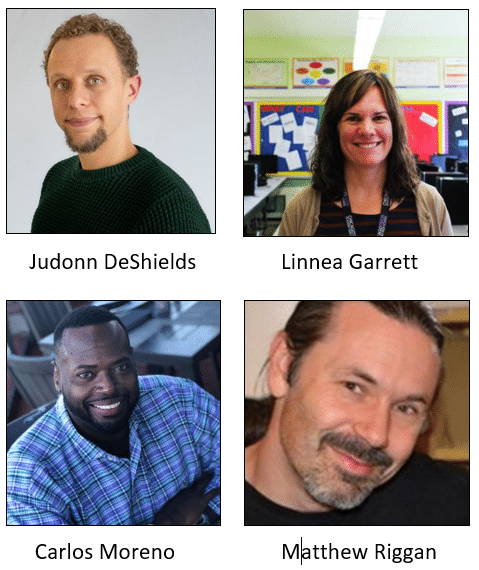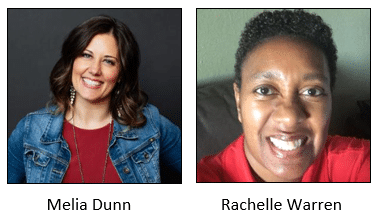Deep Poverty, Deeper Learning, and Being an Ally
CompetencyWorks Blog
This is the last post in a series about equity and anti-racism issues discussed at the SXSW EDU 2019 conference. The two sessions reviewed in this post are Deep Poverty and Deeper Learning, and Let’s Get Real: A Primer for Allies. Links to the other posts are at the end of this article.
 Deep Poverty and Deeper Learning
Deep Poverty and Deeper Learning
Too few schools committed to deeper learning serve students in concentrated poverty, according to this session’s panelists, but all four of them work in or with schools that are trying to do just that. The three presenters were high school principals—Linnea Garrett from Chicago Tech Academy, Matthew Riggan from The Workshop School in Philadelphia, and JuDonn DeShields from El Centro de Estudiantes in Philadelphia—and the discussant was Carlos Moreno, co-executive director of Big Picture Learning.
Multiple panelists touched on the theme of not assuming that students are ready and open to welcome the deeper learning options being offered to them. This is because students in deep poverty often have good reasons to distrust schools and the adults in them. Matthew noted that offering students voice and choice doesn’t mean that they will immediately open up and go along, after years of being told that they are “special needs” and other words that they hear as “inferior” or “problematic.”
Linnea emphasized that getting to the know students well has been essential, and something the school wasn’t doing enough at first. The key is “pouring love” into students, even when they push back against it, and bringing adults into the school who are able to do this and understand the importance of relationships with students. Matthew agreed, saying that “cool projects” are not what gets kids to keep coming back to school—it’s the sense of community and that people care about them.
Sometimes this caring takes unconventional forms that meet students where they are. Carlos shared a story of a school in his network that struggled with very low attendance rates. The principal learned that a major reason students were missing school was that they didn’t have clean clothes and were getting bullied because of it and were embarassed that their families lacked the resources to do laundry. The principal obtained a grant to buy washing machines and dryers for the school, and attendance increased substantially. (News of this spread, and the principal was invited onto the Ellen Show to share his story with a very large audience.)
The panelists were also asked what keeps them up at night:
- Judonn said that his school has a 75:1 ratio of students to counselors, which is great by district standards, but still not nearly enough because students’ needs are so deep.
- Linnea has heard from students who got to college and didn’t feel academically prepared. She also said that students have far more power to make change in high school than afterwards, and she wants to help them build the resilience to prepare for that.
- Matt said his school needs better discipline strategies, and they are exploring restorative justice. They are committed to avoid the types of discipline that feed into the school-to-prison pipeline, but he said “when our culture goes sideways, it’s because we’re too permissive.” He also worries about staff burnout, saying “there are so many demands to be mastered, and it takes a toll,” because it can’t reasonably be accomplished while teaching 6 ½ hours per day with only a 45-minute prep period.
- Carlos discussed a school in his network that has lost 17 students to violent deaths in nine years. He noted that “although we’re working our tails off,” there are too many factors beyond the school’s control.
In his summary reflection, Carlos said that more people are getting pulled into the conversation around race in good ways. Specifically, he mentioned that major media outlets are reporting more on issues related to poverty, racism, and education. This reporting included a groundbreaking set of findings and compelling graphics in the New York Times about the Punishing Reach of Racism for Black Boys. ProPublica also provides an interactive tool that allows 96,000 schools in 17,000 districts to ask Is There Racial Inequality at Your School?, with extensive data on racial disparities in educational opportunity.
Despite these findings, Carlos emphasized that “demography doesn’t need to equal destiny,” and that we have many counterexamples of youth who beat the odds. To make this the norm rather than the exception, students from marginalized groups need not only “allies” but also “accomplices,” people who are willing to “roll up their sleeves and get involved.”
 A Primer for Allies
A Primer for Allies
The final session related to equity and anti-racism that I attended at SXSW EDU was Let’s Get Real: A Primer for Allies. The session’s premise was that “Before accepting a call to action, allies must first check their own biases, expectations and privilege in relation to the community they intend to impact.” It was a workshop that I participated in, and I’ll share a few takeaways and resources provided.
The presenters were Melia Dunn, a coach and consultant for diversity, equity, and inclusion work, and Rachelle Warren, the Director of Social-emotional Learning and Multi-Tiered Systems of Support for the Belton Independent School District in Texas. Both formerly worked for the Anti-Defamation League, which they described as a “Global anti-hate organization since 1913, with a longstanding commitment to secure justice and fair treatment for all people.”
Some takeaways from the session:
- “Bias is universal, but prejudice can be unlearned. Change is a process.”
- Allies never get a graduation ceremony and a medal saying “I’m an ally!” Being an ally requires an ongoing self-check. You need to stay in that reflective state.
- It’s #NotAboutYou. You can’t create connection across challenging differences if you make the issues and dynamics all about yourself.
- Allies should figure out how to promote equity and anti-racism without expecting people from marginalized groups to take on the potentially exhausting task of explaining it to them.
Some resources from the session:
- We all completed a reflective Self-Assessment of Anti-Bias Behavior Worksheet that provided good opportunities to identify areas for improvement.
- The facilitators had a list of “Traps and Pitfalls for Allies to Avoid,” which I was able to find online (with a slightly different title) as pages 20-21 of this document. They put the 40 pitfalls onto index cards, we all got two of them, and then we went around talking with each other about which of the issues would be most helpful for each of us to work on. Discussion topics included “A time you remember experiencing this pitfall,” “Your hunch about what might be at the root of this pitfall,” and “Ideas about how you might work toward avoiding this pitfall.”
Conclusion
Big tent professional meetings seem to be addressing topics such as inequity, racism, bias, discrimination, intolerance, marginalization, and privilege—and what we can do about them—more deeply than in the past. I’m thinking not only of SXSW EDU 2019, but also the iNACOL and Student-Centered Learning Research Collaborative conferences I attended a few months ago.
This greater prominence, if I’m gauging it accurately, doesn’t ensure that we are reducing or solving the problems more quickly. To me it feels that we’re advancing on some fronts and falling further behind on others. But surely it’s good that we’re talking about it, and the presentations and discussions felt helpful in supporting and inspiring audience members to reflect and take action.
Other posts in this series:
- Amplifying Messages on Equity and Anti-Racism from SXSW EDU
- Elevating the Voices of Public School Advocates of Color
Eliot Levine is the Aurora Institute’s Research Director and leads CompetencyWorks.